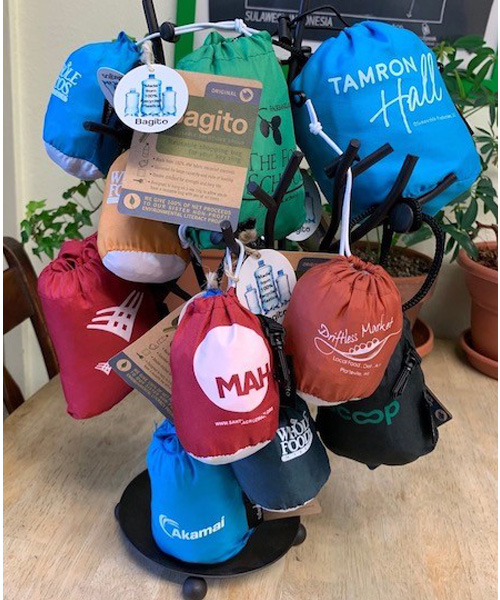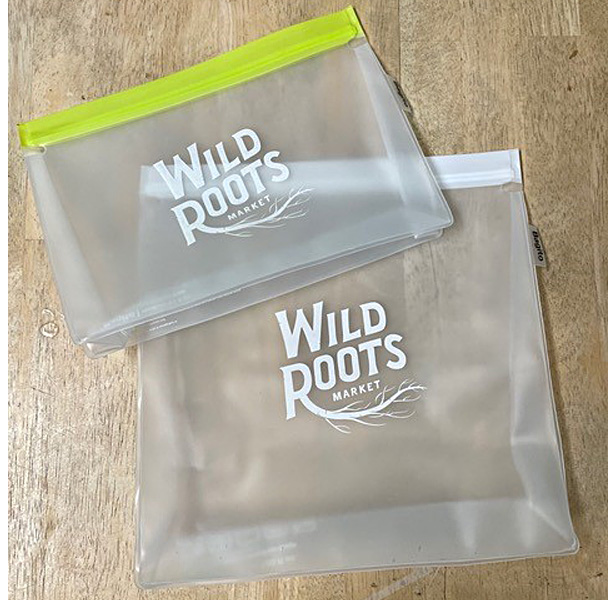June 16, 2023
Educating the World To Be Reusable
Supplier Bagito was formed to help fund a nonprofit that teaches K-12 students environmental literacy.
Mitch Barlas has a passion for education.
He spent the first two decades of his career as a teacher and administrator in public schools. While serving as an assistant principal at an elementary school in the Bronx in 2008, Barlas and a group of teachers were inspired to create a free K-12 curriculum to teach students about the effects of climate change.
“They’re going to inherit this planet,” Barlas says. “They deserve to be educated a little bit about what’s going on.”

Bagito creates reusable shopping bags made of recycled polyester that can be folded up into a compact convenient carrying case.
That curriculum eventually became the nonprofit Power2Sustain, and Barlas and his fellow educators realized they needed funding to help keep the program going. Taking a cue from the Girl Scouts and their ubiquitous cookie sales, Barlas founded Bagito (asi/37896) to raise money for his nonprofit.
“I didn’t want to be writing grants and begging for money,” Barlas says.
Instead, Bagito, a certified B Corp, makes compact reusable bags out of recycled PET and a range of other reusable products; 10% of sales are donated to Power2Sustain to ensure that its environmental literacy curriculum stays up to date and accessible to teachers and students. Bagito’s products – and built-in giveback model – quickly caught the eye of corporations like Facebook, which wanted to incorporate the reusable bags in its market and PR efforts.
“I knew nothing about the promotional item industry at that point,” Barlas recalls.
Facebook placed a few initial orders then introduced Bagito to its promo distributor, opening Barlas’ eyes to a whole new world. “We saw a niche that was wide open, helping companies have a very sustainable, useful product and a giveback together,” Barlas says.
Bagito has been an ASI supplier since 2014, but Barlas notes that he’s seen a “pretty big increase” in the last couple of years with brands, large and small, looking for products that help people be more sustainable.
The original Bagito, made from recycled materials, is designed to be compact enough to fit in a back pocket or clip onto a purse, but unfolds into a full-size bag. But Bagito has also delved into other reusable product lines.

Other products Bagito offers include reusable snack pouches.
For instance, a large tech client decided to forgo individually packaged office snacks and instead started buying goodies in bulk containers with a dispenser. The company bought a bunch of Bagito’s Zip-Em storage bags and distributed logoed versions to each employee, so they could fill them up at the snack stations then return to their desk.
“It reduced trash by around 20% in their corporate office campuses just from stopping those single-use snack packages,” Barlas says.
Bagito has also created a reusable trash can liner made from 100% PEVA, an alternative to vinyl material. The bags repel odor and are fully washable. When the bag is full, you dump it into your large curbside can, rinse it out with water and dish soap and use it again. Each bag can be used around 600 times, Barlas says. Using the product helps prevent environmentally unfriendly plastic film from entering the waste stream.
Bagito is undergoing a pilot at a large university on the East Coast right now, which is using branded versions of the trash can liner on campus. “When you fold down the lip, there’s a little logo with a message that says ‘Doing our part to reduce plastic,’” Barlas says.
Barlas calls the snack bag and reusable trash liners “deep dive” examples of sustainable promo, but notes that the industry as a whole can and should use its branding power to promote reuse and conscious consumption across a variety of merchandise.
“There can be this education component in our industry that kind of reframes people’s thinking,” he says. “I’m not going to use it once and throw it away. I’m going to reuse it. I’m going to gift it to someone who I think could use it.”

Promo for the Planet is your destination for the latest news, biggest trends and best ideas to help build a more sustainable and socially-responsible industry.
